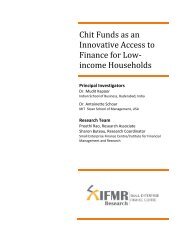Government of India Volume I: Analysis and Recommendations
Government of India Volume I: Analysis and Recommendations
Government of India Volume I: Analysis and Recommendations
Create successful ePaper yourself
Turn your PDF publications into a flip-book with our unique Google optimized e-Paper software.
FUNCTIONS AND POWERS OF THE REGULATOR<br />
Table <strong>of</strong> <strong>Recommendations</strong> 4.11 Requirement for proportional penalties<br />
The regulator must ensure that the penalties deter potential violators in the future. It is impossible to ensure that all<br />
violators are caught. However, violators must pay fines proportional to the damage <strong>and</strong> the illegal gain. The following<br />
are the steps the regulator must follow:<br />
◮ For each violation, the regulator must carry out an investigation on the illegitimate gain made by the violator;<br />
◮ The regulator must make an effort to determine the amount <strong>of</strong> illegitimate gains made by the violator;<br />
◮ The penalty will be a multiple <strong>of</strong> the illegitimate gain, but limited to a maximum <strong>of</strong> 3 times the illegitimate<br />
gain;<br />
◮ The regulator must compensate any direct victims <strong>of</strong> the violations if they can be ascertained; <strong>and</strong><br />
◮ The regulator must have regulations <strong>and</strong> processes for calculating <strong>and</strong> enforcing the fines.<br />
Table <strong>of</strong> <strong>Recommendations</strong> 4.12 Compounding <strong>of</strong> <strong>of</strong>fences<br />
The system for compounding <strong>of</strong>fences must:<br />
◮ Be guided by a policy set out by the regulator;<br />
◮ Have adequate checks <strong>and</strong> balances to prevent interference from external parties;<br />
◮ Be transparent to prevent allegations <strong>of</strong> favouritism;<br />
◮ Consider previous behaviour <strong>of</strong> the party; <strong>and</strong><br />
◮ Consider whether the party itself <strong>of</strong>fered compounding before any investigation was started.<br />
4.2.7. Compounding <strong>of</strong> <strong>of</strong>fences<br />
The Commission believes that the system <strong>of</strong> compounding <strong>of</strong>fences is important for reducing<br />
judicial burden <strong>and</strong> addressing minor violations, which are common in the financial<br />
sector. However, the system <strong>of</strong> compounding <strong>of</strong>fences requires a st<strong>and</strong>ardised structure<br />
across all regulators which is not present as <strong>of</strong> date. The recommendations <strong>of</strong> the<br />
Commission are provided in Table 4.12.<br />
4.3. Administrative law <strong>and</strong> role <strong>of</strong> tribunals<br />
In exercise <strong>of</strong> their supervisory <strong>and</strong> enforcement powers, regulators need to assess whether<br />
or not regulated entities have adequately complied with the provisions <strong>of</strong> financial<br />
laws <strong>and</strong> in case <strong>of</strong> any detected breach, they have the power <strong>of</strong> impose appropriate<br />
penalties. These wide ranging executive powers given to regulators necessarily need to<br />
be balanced with proper systems governing the application <strong>of</strong> administrative law. Therefore,<br />
the Commission recommends that the exercise <strong>of</strong> quasi-judicial (administrative law)<br />
functions by regulators needs to be carried out within the bounds <strong>of</strong> a sound legal framework<br />
that ensures the separation <strong>of</strong> administrative law powers from other powers <strong>of</strong> the<br />
regulator.<br />
In addition, there also needs to be a mechanism to review the actions taken by regulators<br />
in exercise <strong>of</strong> their quasi-judicial functions. Given the specialised character <strong>of</strong> financial<br />
markets <strong>and</strong> the complicated nature <strong>of</strong> issues involved, the Commission finds<br />
that there is a strong case for having a dedicated appellate tribunal.<br />
The Commission therefore makes specific recommendations in respect <strong>of</strong> the processes<br />
governing these two areas:<br />
1. Administrative law functions carried out by the regulator: How the regulator separates <strong>and</strong> carries<br />
out regulatory function within its organisation.<br />
2. Judicial review by appellate tribunals: How the decisions <strong>of</strong> the regulator are reviewed through a<br />
dedicated financial sector appellate tribunal.<br />
4.3.1. Administrative law functions <strong>of</strong> the regulator<br />
At the level <strong>of</strong> the regulator’s board, at least one executive member should be designated<br />
FINANCIAL SECTOR LEGISLATIVE REFORMS COMMISSION 37



